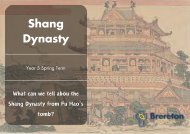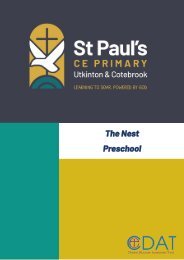You also want an ePaper? Increase the reach of your titles
YUMPU automatically turns print PDFs into web optimized ePapers that Google loves.
Viking<br />
York<br />
Year 4 <strong>Spring</strong> Term<br />
Were the <strong>Vikings</strong> raiders or<br />
traders?
Unit Overview<br />
In this unit, pupils will learn about the arrival in Britain of the Norse people,<br />
known as the <strong>Vikings</strong> and they will consider the key question: Were the<br />
<strong>Vikings</strong> raiders or traders?<br />
Pupils will learn about the raids of Lindisfarne and explore the reasons for<br />
the <strong>Vikings</strong> coming to Britain and where they came from. They will learn<br />
about the capture of York and how the <strong>Vikings</strong> conquered most of the<br />
British kingdoms, leading King Alfred to offer a peace treaty.<br />
Pupils will study how the <strong>Vikings</strong> lived, including their roles a farmers,<br />
craftsmen and merchants. They will also explore their religious beliefs.<br />
Throughout the unit, pupils will use a range of primary and secondary<br />
sources, including maps and artefacts. Their final task will be present their<br />
own summary of the key question, using what they have learnt to justify<br />
their response.
Golden Threads<br />
Timeline:<br />
793 AD<br />
The <strong>Vikings</strong> raided<br />
Lindisfarne.<br />
794<br />
First Viking raids in<br />
Scotland and Ireland.<br />
Golden Threads: Invasion and Empire, Trade and Employment<br />
In Key Stage 1, pupils learnt about the history of farming and how it had changed<br />
over time, right back to early civilisations. They will build on this knowledge by<br />
learning about how <strong>Vikings</strong> farmed the land in Britain.<br />
In Year 3, pupils studied the Romans and explored the reasons why the Romans<br />
came to Britain. They will then be able to compare these reasons to those of the<br />
<strong>Vikings</strong>, as well as analysing the impact on both invaders had on British rule, life,<br />
culture and religion.<br />
At the beginning on Year 4, pupils will have learnt about life in Britain during the<br />
Iron Age, Stone Age and Bronze Age so they will have a good understanding of life<br />
in early Britain, including farming, tools and trade.<br />
Family Tree<br />
829<br />
Wessex becomes the<br />
Supreme Kingdom.<br />
AD 865<br />
An army of <strong>Vikings</strong> sailed<br />
across the North Sea to<br />
conquer England.<br />
AD 866<br />
The <strong>Vikings</strong> conquer<br />
York.<br />
AD 871<br />
Alfred the Great<br />
becomes King of Wessex. AD 878<br />
Wessex is overrun by<br />
<strong>Vikings</strong> and King Alfred<br />
went into hiding.<br />
954<br />
Eric Bloodaxe, the last<br />
Viking king in England, is<br />
forced out of Yorvik<br />
.<br />
AD 1100<br />
End of the Viking age.<br />
AD 886<br />
King Alfred agrees to a<br />
treaty with the <strong>Vikings</strong><br />
known as ‘Danelaw’.
Love God, Love Learning, Love One Another - Enabling Everyone to Flourish<br />
Overview of Unit<br />
Lesson One:<br />
Children will be able to identify who<br />
the <strong>Vikings</strong> were and where they came<br />
from.<br />
On beginning this topic, we will ask pupils to consider: What do we know<br />
about the <strong>Vikings</strong>? Pupils will record their thoughts and look at stereotypical<br />
images. The teacher will provide pictures of Saxons, <strong>Vikings</strong> and Scots and ask<br />
pupils to make inferences about them and offer comparisons between them.<br />
During this activity, pupils will consider all of different groups such as nobles,<br />
warriors, men and women.<br />
Make deductions from descriptions, myths and legends such as Hengist and<br />
Horsa and Beowulf. Discuss the reliability of such evidence.<br />
Time Team true or false.<br />
When and where did the <strong>Vikings</strong> live?How did they come to Britian? Where<br />
else did they travel? Add these key dates to our class timeline.<br />
Finally, pupils will complete a ‘ship reconstruction relay’. As Anglo-Saxons,<br />
they will spy on the <strong>Vikings</strong> to see what you can find out about Viking ships.<br />
They will then hot seat Sven the boat builder.
Love God, Love Learning, Love One Another - Enabling Everyone to Flourish<br />
Overview of Unit<br />
Lesson Two:<br />
Children will be explain why the<br />
<strong>Vikings</strong> came to Britain.<br />
In this lesson, pupil will explore why the <strong>Vikings</strong> came to Britian? They will<br />
learn about the raids on Lindisfarne and Iona. They will discover where else<br />
the <strong>Vikings</strong> travelled to and how former trade between the <strong>Vikings</strong> and the<br />
Anglo-Saxons meant that the <strong>Vikings</strong> were aware of the wealth in Britian. Using<br />
drama and role play, pupils will explore these reasons further. They will<br />
consider and evaluate ten different reasons the <strong>Vikings</strong> came to Britian and<br />
diamond rank them. Write an devert convincing Norse citizens to leave.<br />
Lesson Three:<br />
Pupils will be able to list the kingdoms<br />
of Britain.<br />
After recapping on where the <strong>Vikings</strong> came from and why they travelled to<br />
Britian, pupils will learn how York was captured and why York became the<br />
most important town in Danelaw. They will then explore maps from the<br />
period and learn about Viking and Anglo-Saxon regions of Britian. Linking back<br />
to their previous work on the city of Chester, pupils will explore how Chester<br />
sat on the boundary of Mercia and Northumberland, how the walls were<br />
strengthened to protect the city and how King Alfred eventually drove the<br />
<strong>Vikings</strong> from the city. and how King Alfred negotiated with the <strong>Vikings</strong> to<br />
prevent further invasions.
Love God, Love Learning, Love One Another - Enabling Everyone to Flourish<br />
Overview of Unit<br />
Lesson Four:<br />
Pupils will be able to share key facts<br />
about Viking life in Britain, including<br />
how they earnt a living and their<br />
religious beliefs.<br />
In this lesson pupils, will further develop their understanding of why the<br />
<strong>Vikings</strong> came to Britian by exploring their role as traders. They will explore<br />
maps of York and list industries and trade, so developing their understanding<br />
of how the <strong>Vikings</strong> traded. During this session, pupils will lay the trading game<br />
and complete a ‘Raiders or Traders’ sorting activity. Following this, children<br />
will consider, ‘What do recent excavations tell us about the <strong>Vikings</strong>?’ Finally,<br />
pupils will learn about the religious beliefs of the <strong>Vikings</strong> in York and how<br />
these developed over time.<br />
Lesson Five:<br />
Assessment: Were the <strong>Vikings</strong> raiders<br />
or traders?<br />
In this final lesson, pupils will recap on why the <strong>Vikings</strong> came to Britian and<br />
consider whether they are better classified at raiders or as traders. Pupils will<br />
then compose their defense or prosecution statements, arguing their key<br />
points.
Vocabulary<br />
Historical<br />
Knowledge<br />
I can use evidence to reconstruct life in the time<br />
studied.<br />
I can identify key events and features.<br />
I can offer reasonable explanation for some<br />
events.<br />
archeology<br />
artefacts<br />
conquer<br />
The study of human history by examining artefacts<br />
excavated from the ground.<br />
An object made by a human being, typically one of<br />
cultural or historical interest.<br />
To take control of a place by military force.<br />
Chronology<br />
Interpretation of<br />
History<br />
I can place events studied in a time line.<br />
I can use terms related to the time period and<br />
begin to date events.<br />
I can understand more complex terms.<br />
I can look at the evidence available.<br />
I can begin to evaluate the usefulness of<br />
different sources.<br />
I can use reference books and my own historical<br />
knowledge.<br />
invade<br />
To enter a country by force.<br />
kingdom<br />
Monastery<br />
A country or region ruled by a King or Queen.<br />
A building where people lived and worshipped, devoting<br />
their time and life to God.<br />
Historical<br />
Enquiry<br />
I can use evidence to build up a picture of the<br />
past.<br />
I can choose relevant material to present a<br />
picture of one aspect of life in time past.<br />
I can ask a variety of questions.<br />
Scandenavia<br />
Name given to counritres in Northern Europe including<br />
Denmark, Sweden and Norway.<br />
Organisatin &<br />
Communication<br />
I can select data to answer historical questions.<br />
I can display findings in a variety of ways.<br />
I can work independently and in groups.<br />
settlement<br />
A place or region where people come to live.<br />
Danelaw<br />
The Danelaw is an 11th-century name for an area of<br />
Northern and Eastern England that was under the<br />
control of the Danish Viking empire.<br />
Key Skillss
Homework Challenges<br />
Research Viking names (people and places).<br />
Build a model Viking longship, shield or home.<br />
Write a newspaper article depicting key events (raids, battles etc).<br />
Assessment<br />
Socrative Quiz - SOC-74833970<br />
RECOMMENDED READS<br />
RECOMMENDED READS<br />
RECOMMENDED READS<br />
Enrichments<br />
Residential to York to visit the Museum of Farming, Yorvik<br />
Centre and York Minster.
















